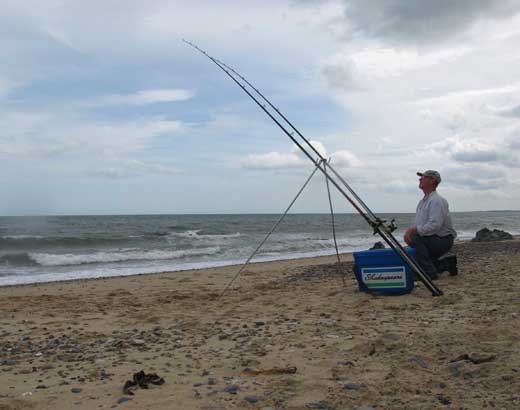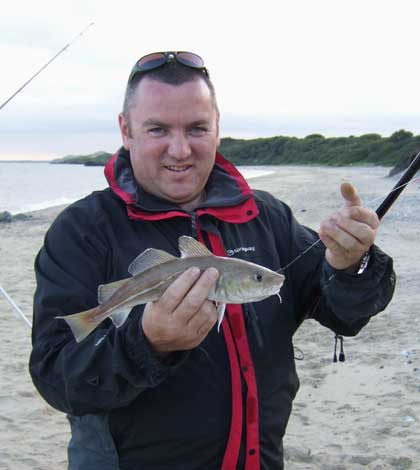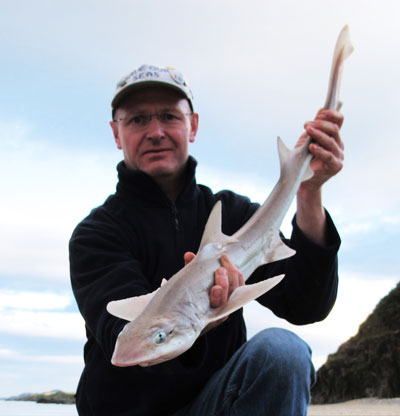In the early 1990′s this writer gave up beach casting as a waste of time due to the deterioration in size, quantity, and variety of fish stocks caused by over fishing at sea in conjunction with the annual visible destruction of the offshore environment off the Wicklow coastline inflicted by bottom mussel dredgers, subsequently felt onshore within a year or two of their moving on in the guise of a once burgeoning littoral zone now rendered lifeless.
By 2007 appalled at the extent of this decline made all too apparent after a first boat fishing trip off Greystones in nearly two decades, the idea for An Irish Anglers World was spawned, a website informed by regular sea angling trips and desk top research highlighting this inshore marine decline while also offering workable solutions. Dusting down the sea angling gear a first foray was made evening beach casting off Ennereilly on the 03/09/2007, a balmy Autumn evening characterised by slack winds and a calm sea.
That evening using lugworm codling, flounder, gurnard, and dogfish were beached steadily throughout the session. Another trip added dab to that list and on the 14/10/2007 a fine bass of six pound and a seven pound smoothie brought the species count up to seven. Below is a diary entry for that day and an image of the bass which on being gutted proved to be stuffed with mussel.
Ennereilly, Co. Wicklow, 14/10/2007. Shore Angling, 15.30-19.30pm.
Tide: High Water Arklow @ 23.24 pm.
Weather: Southerly force 3-4. Overcast. Mild.
Sea conditions: Roll on sea, no white horses, single wave on beach, stirred up, no weed, no lateral tide run.
Bait: Lugworm, Ragworm, Frozen Mackerel.
Fish caught: Bass (6.00 lbs), Flounder x 2 (over 30 cms), Smooth Hound (7.00 lbs).
Trace: Two hook paternoster, 18 inch snoods, 2/0 Aberdeen hooks, no beads, 5. Oz grip lead.
All fish caught close in on Lugworm, close to rock forty meters out and to the right of my position. Bass and smoothy gave very light bite indication. Bass caught about 17.30 pm, smooth hound around dusk at 19.00 pm approx. Strong fight from each. Bass had mussel in its gut.
Fished north end of beach, band of weed about 15 meters out running from rocky spur to my left. Gap of about 50 meters to rocky weedy reef about forty meters out and to my right. Other than that sea bed clean. On previous
visit have caught Codling to a little over a pound here, also on Lugworm.
Since Autumn 2007 according to diary entry records and file images 16 visits have been made to the same location. Dates and times have varied from May through to December with most sessions occuring between the period July to mid October. Up to Autumn 2010 fishing was consistant across the range of species listed above, with flounder particularly prevalent.
Since then it has declined considerably, year upon year getting worse. It is no coincidence that in late summer early autumn 2010 a mussel dredger was seen working in the area, most likely the same mussel dredger reported by the Independent on the 01/09/2010 which was escorted into Arklow harbour twice inside 24 hours for illegal mussel dredging. The skipper was quoted; “We are not fishermen, we are farmers. If we have no mussel seed we have no future.” Typically not a thought given to the wider public or the consequences of his actions.
2011 saw a proliferation of smooth hound with waves of this hard fighting doggie foraging along the shoreline. It was not unusual if fishing two rods for the pair to buckle over simultaneously the result of hungry hounds exiting stage left. Flounder and other species were noticably fewer on the ground that year with fishing trips relying on hounds to make the day. Whereas before rod tips would nod throughout a session if one got the tide and conditions right providing a range of species, now the mark was becoming more an all or nothing job with even LSD’s becoming fewer, the result one assumes of being fished for locally and converted into whelk bait.
In 2012 yours truly fished the venue once catching a smoothie, however friend David Murphy fished it on a number of occasions landing mainly hounds with an odd doggie and a surprise ten pound thornie bringing the species count to eight while resurrecting memories of the venues illustrious past. Overall though the fall from grace was manifest and this has continued into 2013 culminating in a session yesterday where accompanied by marine scientist Ed Fahy targeting bass with razor and rag under ideal conditions we blanked. Ed commented, “our baits are coming in untouched, where are the crabs?”
Mirroring the previous Sunday’s experience off Toberpatrick, Ireland’s east coast inshore waters through man’s intervention have become a desert. Mussel dredging is the cause removing habitats once home to a host of interacting species. Now homeless and exposed, possibly also deprived of their natural food they move on, are predated upon or die off. The end result is baits coming in untouched a clear sign of organisms down the food chain disappearing. Without their presence fish, even if they are swimming offshore, won’t be attracted inshore to feed, quite simply “no food, no fish, a sad feature common to the inshore waters off Co. Wicklow where mussel dredging has been practiced for decades. Sea angling, an activity worth €127.5 million to the Irish economy in domestic and tourism receipts is being slowly strangled due to blind political expedience towards a few. This status quo has to change, it cannot be allowed to continue, the above narrative a testament to the truth……….
Postscript, Wednesday 21st August 2013: Talking to an Arklow based angler who I know well, for certain at least one local whelk boat is not only netting LSD’s for bait but is also using smooth hound and bull huss too. Well that explains the reduction in size and numbers of smoothies caught off Ennereilly lately. As stated the whelk fishing sector is unregulated, they just do as they please.









